Prospera : Inside the City That Lets You Choose Your Laws
I Visited Próspera, the World’s First Free City
Note : This article is the 3rd in a series on how the internet and globalization are disrupting nation-states—and what new governance models may emerge. Here are the first articles in the series:
In the previous article, we looked at the concept of Charter Cities and how the initial project to implement it in Honduras fell through, despite the involvement of its creator, Nobel Prize-winning economist Paul Romer.
Fortunately, around 2015, Titus Gebel, a German lawyer and entrepreneur, had the idea of modifying the concept.
“Is it really necessary to have another state act as guarantor?” he wondered. “Some people might see this as a form of neo-colonialism. Why not consider the same concept, but with a company at the helm?”
He continued to develop this idea until he wrote a book, Free Private Cities, which was published in 20181.
To say the least, he significantly expanded Paul Romer’s original idea.
Because, beyond eliminating the need for a state, Gebel’s vision is quite grandiose, as you can see for yourself, because he ultimately envisions:
Dozens or hundreds of free cities around the world
Each of which would allow a different social and economic model to be tested, without the need for revolution and without subjecting those who disagree to the “tyranny of the majority” (or minority),
as they would all be populated on a voluntary basis.
Do you want to set up Marxism 2.0? A libertarian city? A deeply pious city that follows the teachings of your religion’s holy book to the letter? Or, on the contrary, a city that rejects all religion and focuses on a spiritual life based on science? Go ahead, set it up, test your ideas against reality, and see if you can make your project a viable city.
This creates friendly competition that allows dozens or hundreds of different social and economic models to be tested in practice, very quickly, promoting a Darwinian selection process that will naturally bring about, at a speed never before seen in human history, successful models that other societies can draw inspiration from.
This proposal is already extremely innovative. With it, revolutions become unnecessary, and aging systems that have long passed their sell-by date can finally be replaced. Make way for an ecosystem that encourages everyone to set up a concrete experiment to validate that their ideal societal model works, or to join the free city that offers the model closest to their ideal.
Beyond this vision, Gebel proposes his own model in this book, in which a private company acts as the city’s administrator and “public service provider,” providing services such as the protection of rights, freedom, and property.
For these services, residents sign a “citizen contract” and pay a fixed annual fee.
A key aspect is that the company cannot unilaterally modify this contract (we will return to this point in more detail shortly).
Any disputes between citizens and the provider are resolved by independent arbitration tribunals.
If the company fails to meet its obligations, it risks bankruptcy, as citizens can decide to leave.
In this model, citizens become “customers” and enjoy greater freedom. The relationship is based on a mutually agreed contract, similar to common commercial transactions. The idea is based on transferring free market principles to governance, with an emphasis on voluntarism, competition, and the exchange of services.
Membership in such a city is voluntary, which obliges the provider to offer attractive services, and the company’s basic offering includes security, legislation, basic infrastructure, and dispute resolution. Ideally, these cities are established on previously uninhabited land to ensure entirely voluntary membership.
Unlike traditional government systems, this model directly links payment and services. Both parties, citizen and provider, have equal rights and are bound by contract.
You will notice that modern mobility is built into the system as a key counterbalance, increasing competitive pressure on the operator, motivating them to perform well, whereas traditional governments see this mobility as a threat.
An interesting model, isn’t it?
But it doesn’t stop there: this is not just a theoretical model. In fact, as I write these lines, it is being implemented in practice.
Próspera
Some members of the Honduran administration had decided not to give up, even after these initial setbacks. So they introduced a revised law on ZEDEs (Zones of Employment and Economic Development). A group of private entrepreneurs then approached Gebel in 2016, just after he had started giving lectures on the subject of free cities, to ask for his help in implementing this concept in Honduras.
He agreed and spent months helping them draft a charter that combined the necessary criteria established by the ZEDE law with elements of his free city concept. When, after all this work, certain elements threatened to block any progress, he even locked himself in with other members of the project and the main government representatives involved, with everyone promising not to leave until all outstanding issues had been resolved.2 .
It worked, and after three days, an agreement was reached. Próspera was officially launched in December 2017.
Próspera?
As we will see, this is a very ambitious project that offers highly innovative services in terms of governance.
Próspera aims to build a free city on the island of Roatán, located approximately 65 kilometers off the northern coast of Honduras. This initiative was established under the Honduran ZEDE laws mentioned above, which aim to replicate the successful governance experiences seen in cities such as Hong Kong, Shenzhen, Singapore, and Dubai.

Próspera has the following characteristics:
A genuine social contract
“Any set of rules is acceptable, as long as residents voluntarily consent to them and can leave whenever they wish. We believe that citizens must choose to enter a society by giving their informed consent to an explicit social contract, and that they must have the freedom to leave if they feel that the society no longer serves them.”
Titus Gebel, Free Private Cities
Democracies have been built in particular on the concept of the social contract3 , i.e., a set of rights and duties shared between the state and its citizens.
There is a problem with this concept of a contract, however: if it is indeed a contract, where is your signature?
Furthermore, once a contract has been drawn up and accepted by both parties, neither party can unilaterally modify it.
But your government can, and does so every day by passing new laws that represent new rights and duties for you.
If you live in a democracy, in theory, you accept these changes because you voted for representatives of the people who vote on your behalf.
That’s the theory, of course, but what happens if the person you voted for is not elected? And if the person you voted for is elected, what percentage of laws will they vote on in the same way you would have?
So we can see that the social contract is not really a contract at all. It is, once again, a legal fiction, like the famous principle that “Ignorance of the law is no excuse” which even professionals in the field cannot fully comply with.
In Próspera, before becoming a resident, you read and sign a contract between the city operator and yourself, which represents all the laws that apply to you (apart from the constitution and a few Honduran laws that Honduras insisted on enforcing, including laws prohibiting abortion and euthanasia and regulating the possession of firearms).
Neither party may change a single line of this contract without the other’s consent, except in certain duly identified areas of regulation, because Próspera is not a pure implementation of Gebel’s model.
So if the city operator wishes to introduce a new regulation or law into the contract, it cannot simply have it voted on by an assembly: to add this law or regulation to the contract, it must actively negotiate with all the signatories to the contract, who will ultimately be free to accept its inclusion or not, and to ask for something in return or not.
Próspera is therefore the first jurisdiction in the world to offer a true social contract.
Me working from an apartment with a breathtaking view of Prospera
Choose your level of regulation
If you start a business, you will be able to choose your level of regulation, based on three models:
Common law legal liability, with no additional regulation
Yes, you can have a company that does not follow any specific regulations and is simply subject to the typical legal responsibilities of common law (the legal system used in Anglo-Saxon countries and based on a long history of case law).
But these rules are strict and can pierce the corporate veil (i.e., affect you personally, even if you have a limited liability company) in the event of a criminal offense or wrongful conduct (e.g., fraud, lack of informed consent, violence).
This means that anyone who doesn’t like what you’re doing can sue you directly under common law for any damage you cause... and you won’t be able to defend yourself by citing this or that regulation.
So if you think your chances of being sued for damages are low, you can try this option, with the inherent risks it entails.
The ability to choose your laws from a pre-selected package
You are also free to choose the laws and regulations that apply from a panel of reputable countries.
At the time of writing, these countries are: Australia, Austria, Belgium, Canada, Chile, Colombia, Costa Rica, Denmark, Dubai, El Salvador, Estonia, Finland, France, Germany, Guatemala, Hong Kong, Iceland, Ireland, Israel, Italy, Japan, Luxembourg, Mexico, Netherlands, New Zealand, Norway, Panama, Poland, Singapore, Spain, Sweden, Switzerland, United Kingdom, United States.
So you can easily create a dental practice that follows Italian laws and regulations, or a restaurant that applies South Korean ones.
Create your own regulations
Finally, you can propose your own regulations, subject to the approval of the Próspera Council.
A word about insurance
Anyone conducting business in Próspera must have insurance covering any damages resulting from their actions.
If you follow strict regulations, this insurance should be easy to obtain and inexpensive.
On the other hand, if you opt for less strict standards, it could prove more difficult to obtain and more expensive, or even unaffordable if you have chosen to follow no rules other than common law jurisprudence or a house rule known only to you.
Although Próspera can cover most routine activities, residents wishing to engage in unusual activities or seeking to save money can take out insurance with a private provider.
Taxes with upper limits determined in the contract
Próspera’s charter limits income tax to 10%, and any increase requires a constitutional amendment in this system designed to be stable. It also sets total tax revenue at 7.5% of GDP and debt at 20% of GDP, improving fiscal management compared to many countries around the world.
Tax revenues are divided between Honduras (12%), a general service provider (44%) that manages certain services, and the municipal government of Próspera (44%) for other services. HPI, the company in charge of the project, derives most of its revenue from land development and resale, aligning incentives to develop a prosperous city with incentives for the company to be profitable.
At the time of writing, taxes are at the following levels4 :
Corporate tax: 1%
Income tax: 5% on income from Próspera, 0% on income from elsewhere5
VAT: 2.5%
Property tax: 1% per year (but suspended until the ZEDE judicial system is operational)
You can therefore add Próspera to the list of tax havens and low-tax jurisdictions that I compiled in the previous article.
No official currency
In Próspera, it is possible to use any existing currency, including cryptocurrencies: the city prefers to let the market decide rather than impose a national currency.
When I visited, I noticed that almost all businesses located in Próspera accept Bitcoin, and often Ethereum as well.
Internal competition planned and encouraged
If you wish, you can create a “mini free city” within Próspera, and it is even encouraged!
To quote Trey Goff, Chief of Staff at Prospera6 :
“We wanted to allow for the creation of internal competitive pressures on ourselves. Thus, under the charter, any community can create a declaration of community interest and supersede the GSP entirely within the boundaries of its community. This is a miniature competitive jurisdiction within the [larger] jurisdiction of Próspera. It must still comply with Próspera’s statutes, but it is free to establish its own rules, as an HOA does, and it is free to hire its own security guards, as many private subdivisions around the world do.”
Unlike anywhere else in the world, Próspera allows local communities to take over functions that would normally be handled by higher jurisdictions.
Therefore, if any intrepid individual wishes to create a better community, with better rules and better administration than ours, we invite them to do so! Test your Marxist commune in Próspera!
Maybe it will work this time. If so, people will be able to leave the rest of Próspera to settle in your little community, and the ZEDE will have to adapt its meta-institutions accordingly.
Extending the governance model to other locations
In the long term, Próspera plans to add new land to its territory or develop land in other countries that would grant it similar legal status. By 2040, Próspera could evolve into a multi-jurisdictional “network state” with dozens of different locations called “prosperity hubs” operating under its legal and governance framework, using its technology stack and management practices. Potentially, this model could enable a multitude of major innovations that were previously hampered by outdated laws, excessive bureaucracy, and overregulation.
We will examine this concept of a network state in more detail later.
Where does Próspera stand today?
I had the opportunity to visit Próspera in February 2024 for a two-week stay.
I was impressed by what has been achieved in such a short time since the project began (which really got underway in 2020), especially considering the two years of the COVID pandemic, which made things more difficult.
However, it is clear that the project is still in its infancy: when I arrived, I almost felt like a pioneer, like the first Europeans landing in America, arriving in a place where everything still had to be built... while also feeling like I was participating in a project comparable to the Manhattan Project, with a group of hand-picked people, selected through the process: you really have to be a certain type of person to 1) have heard about it and 2) go there.
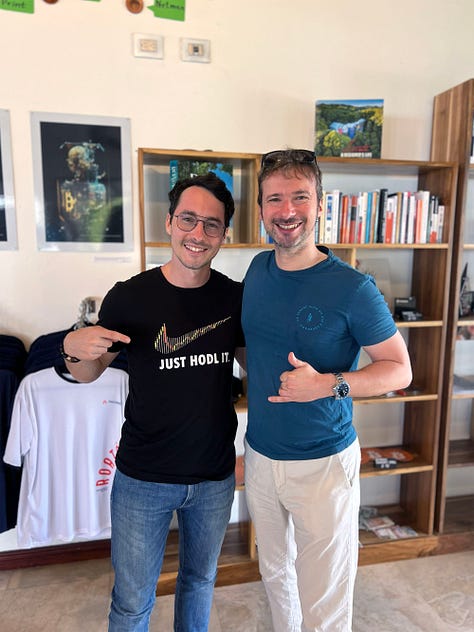
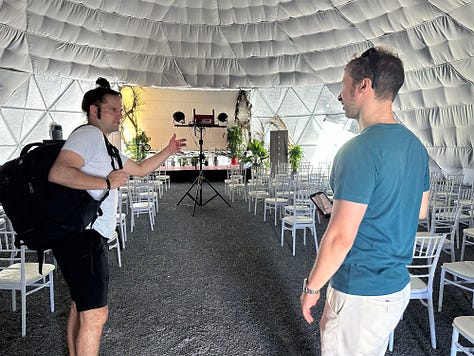
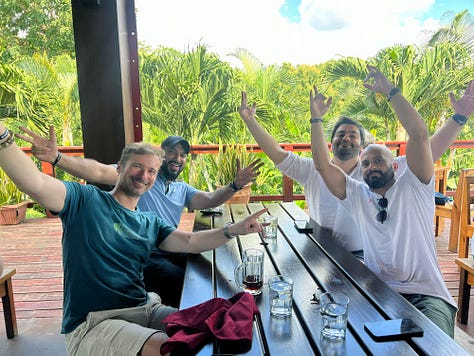
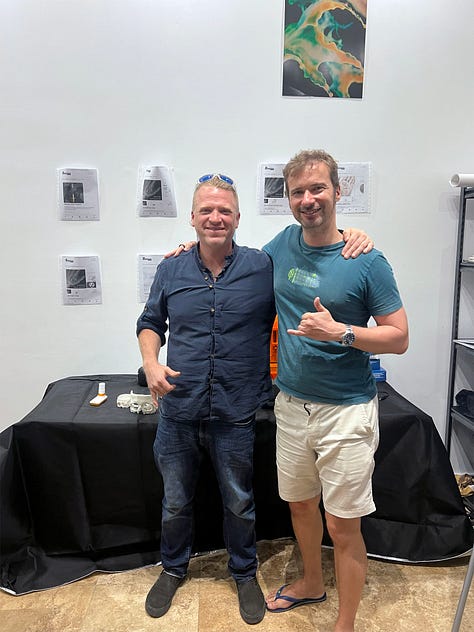
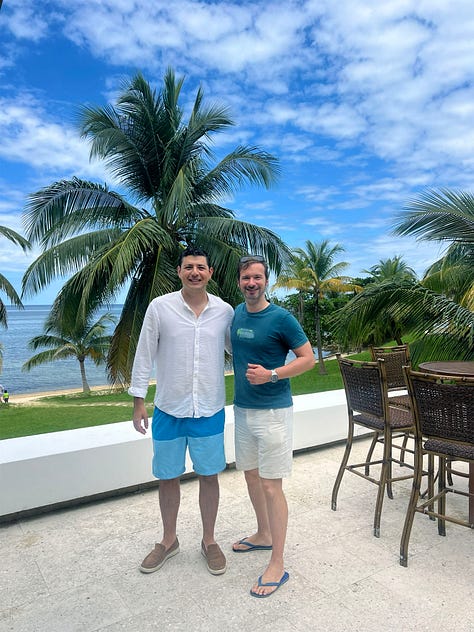
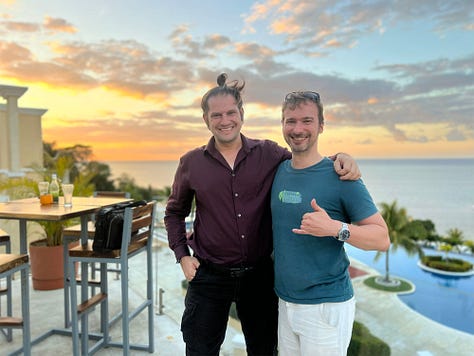
It’s a unique experience, and although we don’t yet know if it will be successful, the excitement is palpable and makes you feel like you’re part of something potentially revolutionary.
Despite the progress made, the project remains very small. There are two main sites: the first, purchased in 2018, and the new area, which is a former golf course with its buildings. They are close to each other but not directly connected, except by the beach.
The golf course is a mosaic of areas belonging either to Próspera or to Honduras. The buildings and beaches there are magnificent.
In conclusion, I am enthusiastic about the project, to the point that I have become an e-resident to support it. I am also an investor via Tipolis, one of the companies created by Titus Gebel, which is investing heavily in this project.
As I write these lines, the first homes have been built, others are under construction, and the first residents have arrived: there are about a hundred of them, plus about 500 people living nearby and working there at least part-time. There are also 1,500 e-residents and 150 registered companies7 .
Challenges
However, various political issues have jeopardized the project.
During her presidential campaign in 2021, opposition candidate Xiomara Castro took a firm stance against ZEDEs (which enabled Próspera to exist), calling them instruments of foreign exploitation, under the slogan “Honduras is not for sale.”
Following her election victory, she promised to abolish them. In April 2022, Congress voted to repeal the ZEDE law and began revoking the constitutional amendments that had allowed their creation in 2013. This process required another vote in another legislative session to confirm or reject the constitutional amendment... which the government failed to obtain at the end of 2023.
To protect itself, Próspera filed a claim with an international arbitration tribunal against the Honduran government, seeking damages of up to $10.775 billion to cover both investments already made and “loss of opportunity,” or lost potential8 . This proceeding is still ongoing at the time of this writing.
Seeing that it could not get the ZEDE law repealed through legislative channels, the government then took a gamble: it asked the Supreme Court to overturn the law, even though the same court had approved it a few years earlier.
And then came the bombshell: in September 2024, the Court decided, by 8 votes to 7, to retroactively overturn the ZEDE law, declaring it unconstitutional9 .
This is a highly controversial decision, which strengthens Próspera’s claim before the international court, but is also a serious blow to the project.
Good News
My discussions with several Prospera residents as I was putting the finishing touches on this article allow me to say that, although they are affected by this decision, they have not lost hope: the current government is very unpopular, and they hope that a new government will be more conciliatory towards them. Furthermore, the Court has adopted a conciliatory tone on investments already made, so it remains to be seen how Prospera will be affected in practical terms.
Finally, several members of the US government and Senate have made public statements about the importance for Honduras to respect its international commitments and the promises made to Prospera10 . This is important to them because many of the investors are American.
And Recently, Dentons, the world’s largest law firm, with high legal credibility, gave its opinion: despite the cancellation of ZEDEs in domestic law, Prospera is protected by international law and can continue to operate for 50 years.
The repeal of the ZEDE law only prevents new projects from being launched, not existing ones from continuing.
That leaves time to see what happens.
If you speak French, you can watch this video I made about my impressions of Prospera
Morazán/Bootstrap City, the other Free City in Honduras
Another project has been launched under the ZEDE law: Morazán, also called Bootstrap City.
It has similarities with Prospera, but also differences. Here are the main points of divergence:
Different target market: Morazán focuses primarily on Honduran workers and low- to middle-income families, offering affordable housing and a safer environment than the rest of Honduras.
Affordable housing: Morazán offers high-quality housing at very low prices (for example, a two-bedroom house for $120 per month, including services such as 24/7 security and hot and cold running water, which is not common in Honduras). This price level is possible thanks to the absence of heavy construction regulations, unlike the rest of Honduras.
Simplified local laws and regulations: Morazán has adopted simplified versions of the Honduran civil and commercial codes, making laws more accessible and understandable for residents and businesses. This reduces the need for expensive legal advice and facilitates commercial transactions.
Safe environment and reduced labor costs: Morazán provides a secure environment, which is very important in a region known for gang violence. Businesses benefit from a reliable workforce close to their workplace, reducing transportation costs and the risk of delays due to security or logistical issues.
In short, Ciudad Morazán targets the local population, while Próspera is aimed more at an international audience, although it does involve part of the population of Roatán Island in the process.
This is a fine example of “synergistic competition,” with these two free zones sharing many similarities while having different objectives.
Coming soon
In the next article, we’ll take a look at how Balaji Srinivasan’s idea of the “network state” could challenge, extend, or even merge with the free-city model we’ve just explored. This concept envisions a country that begins online as a coordinated community before taking physical form.
We’ll also explore what it means for a world where millions of people might one day found a nation from their laptops.
Stay tuned! In the meantime, feel free to follow Disruptive Horizons on X/Twitter & LinkedIn, and join the tribe of Intelligent Rebels by subscribing to the newsletter:
And here are the first articles in this series :
Self-published (and translated into French by a member of my team). You can easily find it on Amazon in paperback, audio, and digital formats.
Free Private Cities, 3rd edition, Titus Gebel, 2023
“Set Up Your Business In Próspera ZEDE,” November 2022 version.
And who may, of course, be taxed in their country of origin depending on the situation.
Via the article “Prospectus On Próspera,” Scott Alexander, 2021, Astral Codex Ten.
All this information was given to me directly by Niklas Anzinger, from the Infinita City Times Substack, who lives in Próspera, during a conversation.
“$10.775 Billion Claim Filed Against Government of Honduras,” Prospera, 2022
“Honduran Supreme Court Declares ZEDEs Unconstitutional,” Charter Cities Institute, 2024
“Próspera CEO Garners Bipartisan Support from Congress,” Prospera, 2024, as well as, for example, Senator Robert Aderholt, in a tweet dated November 21, 2024, U.S. Representative Mario Díaz-Balart, “U.S. Lawmaker Threatens ‘Serious’ Sanctions Against Honduras’s Leftist Government,” Javier Manjarres, 2023, Senators Bill Hagerty and Ben Cardin in a letter to Secretary of State Antony Blinken, “Hagerty and Cardin Urge State Department to Encourage Honduras to Honor Legal Guarantees with Respect to U.S. Investments,” U.S. Senate website, 2022.


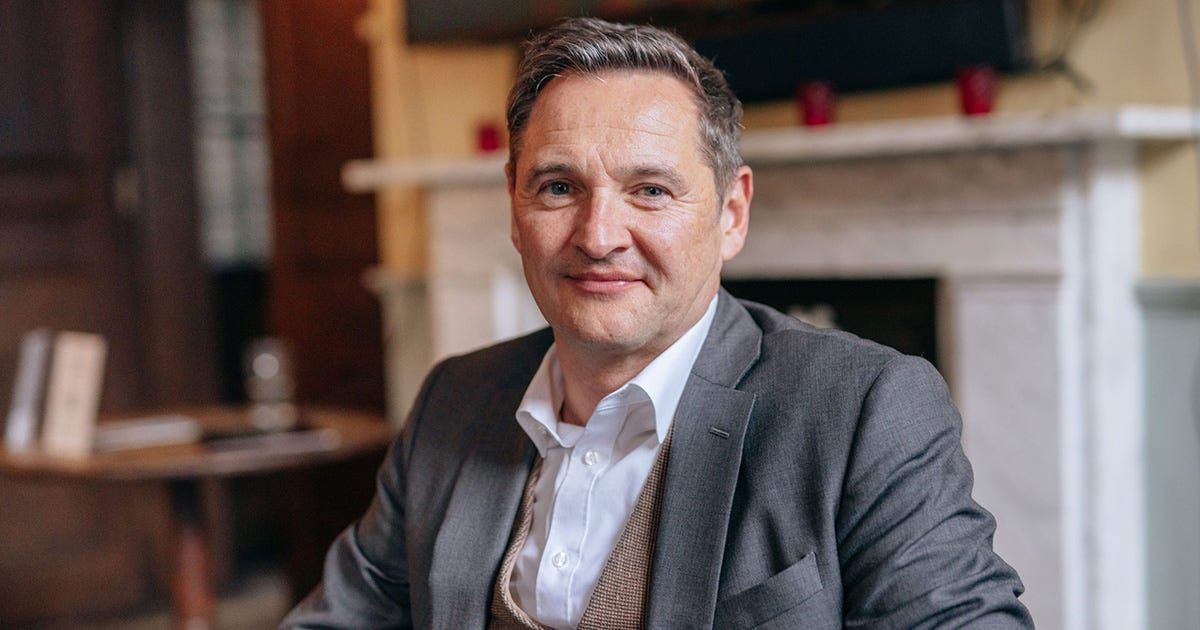
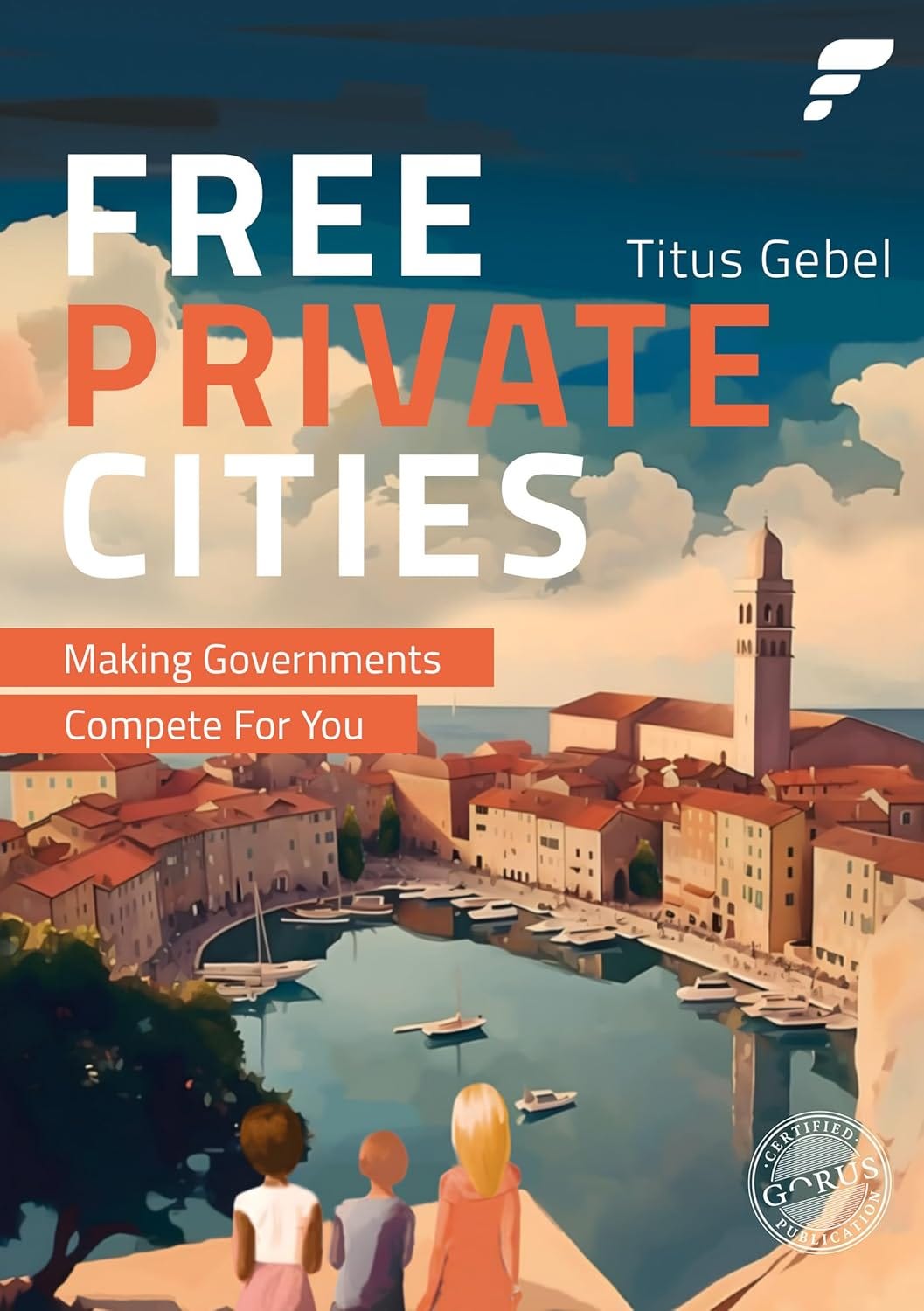
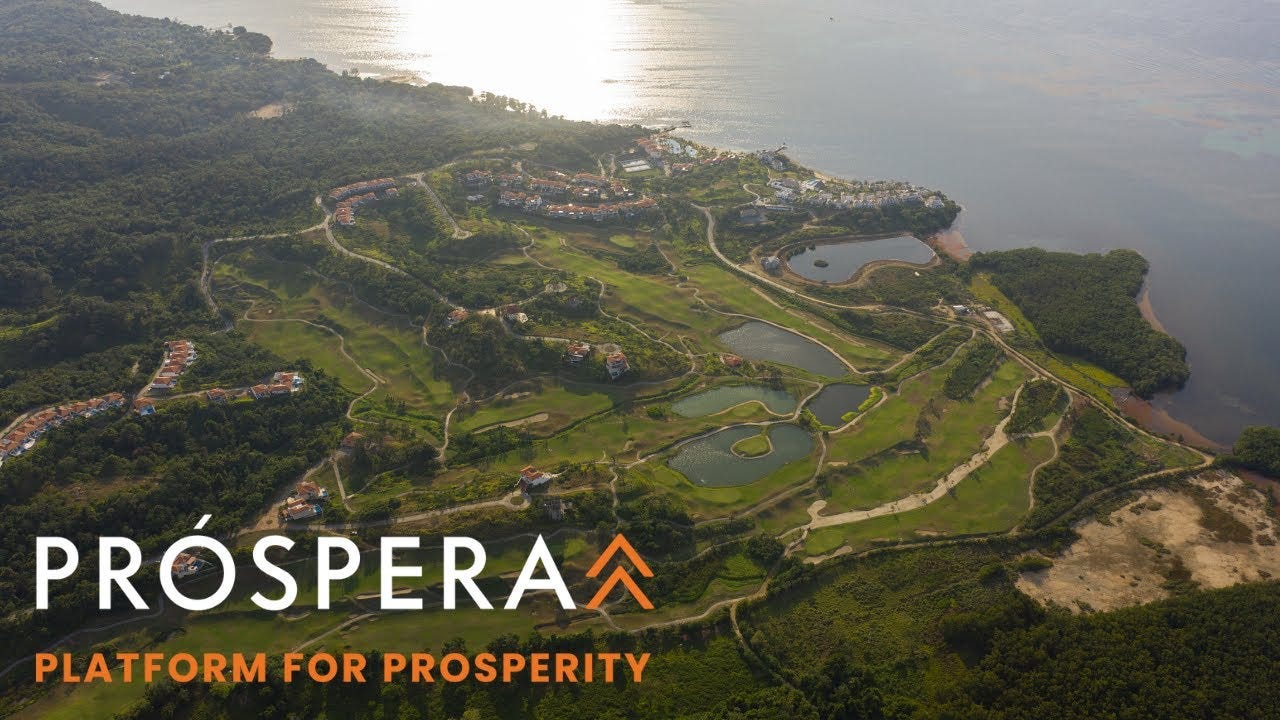
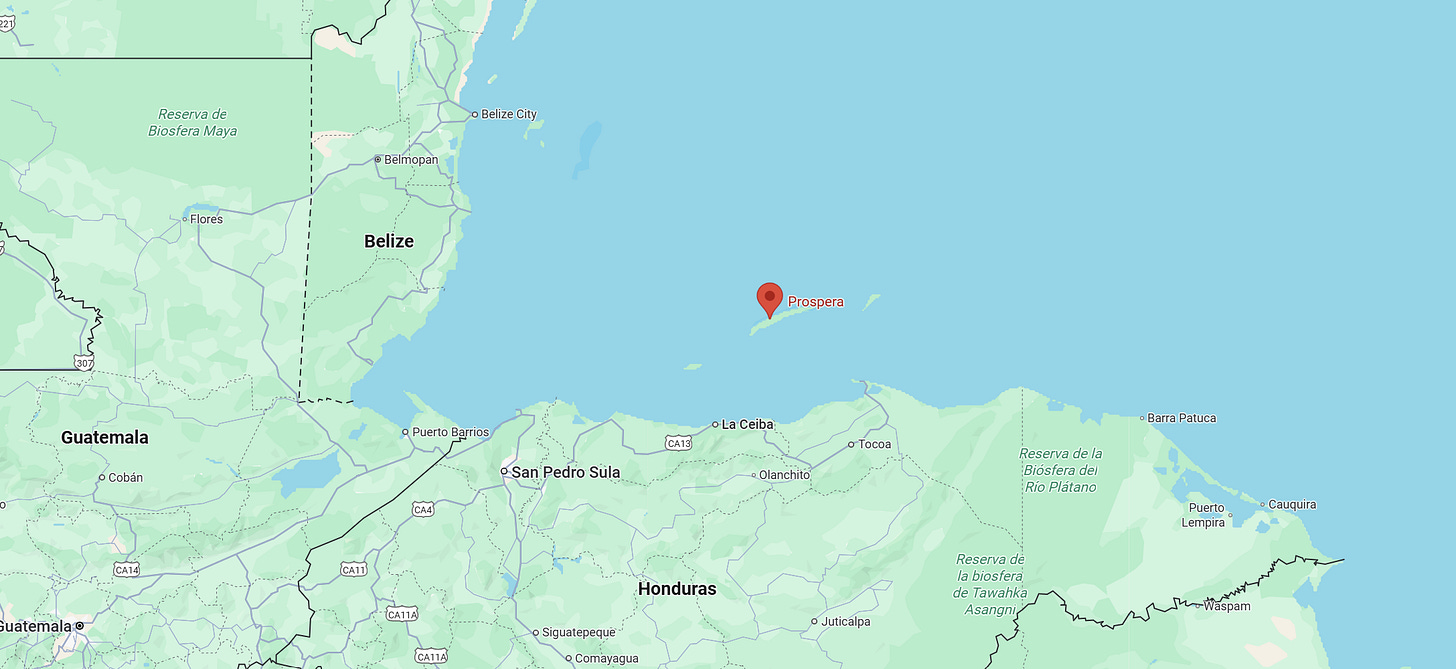

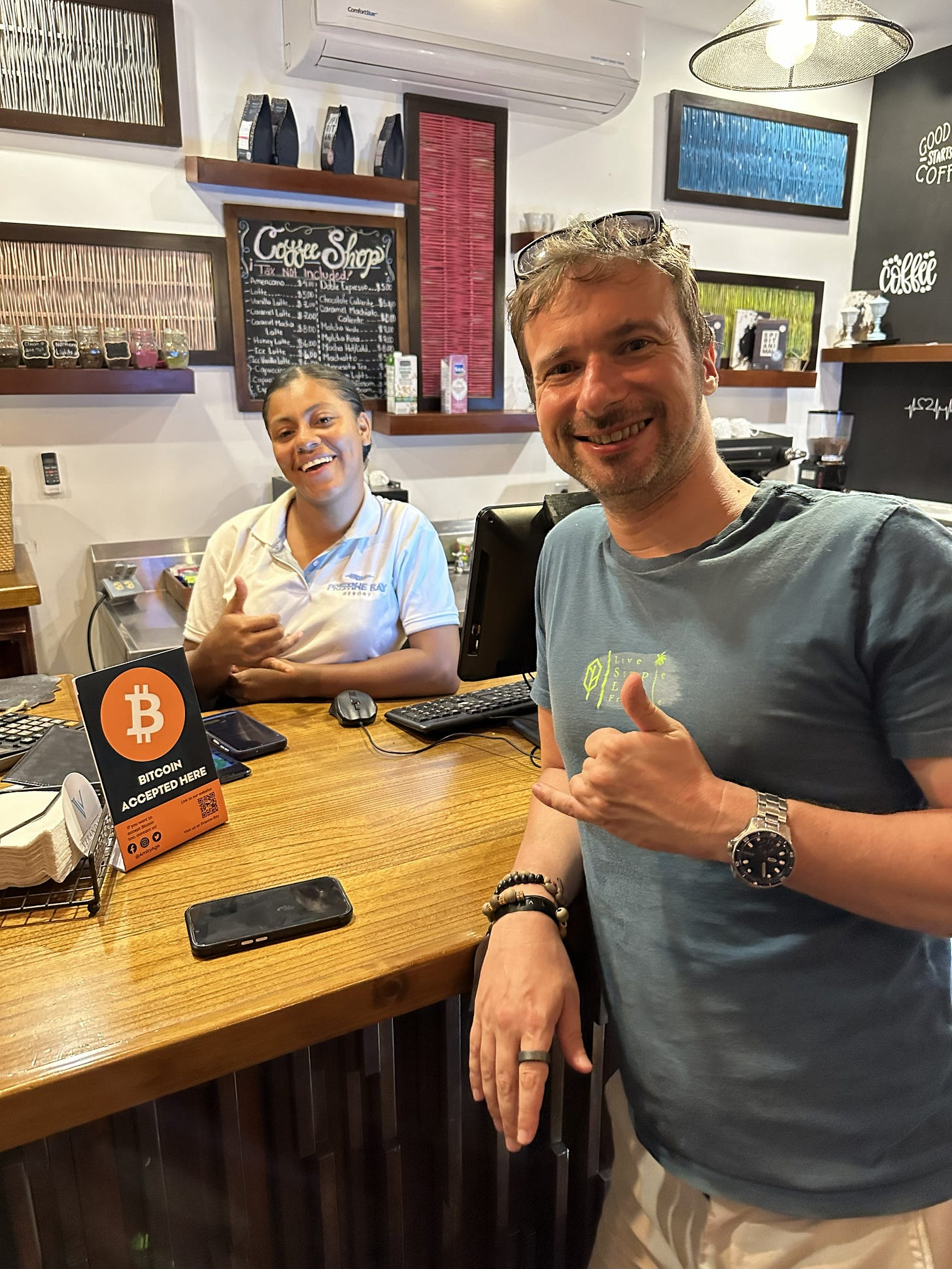
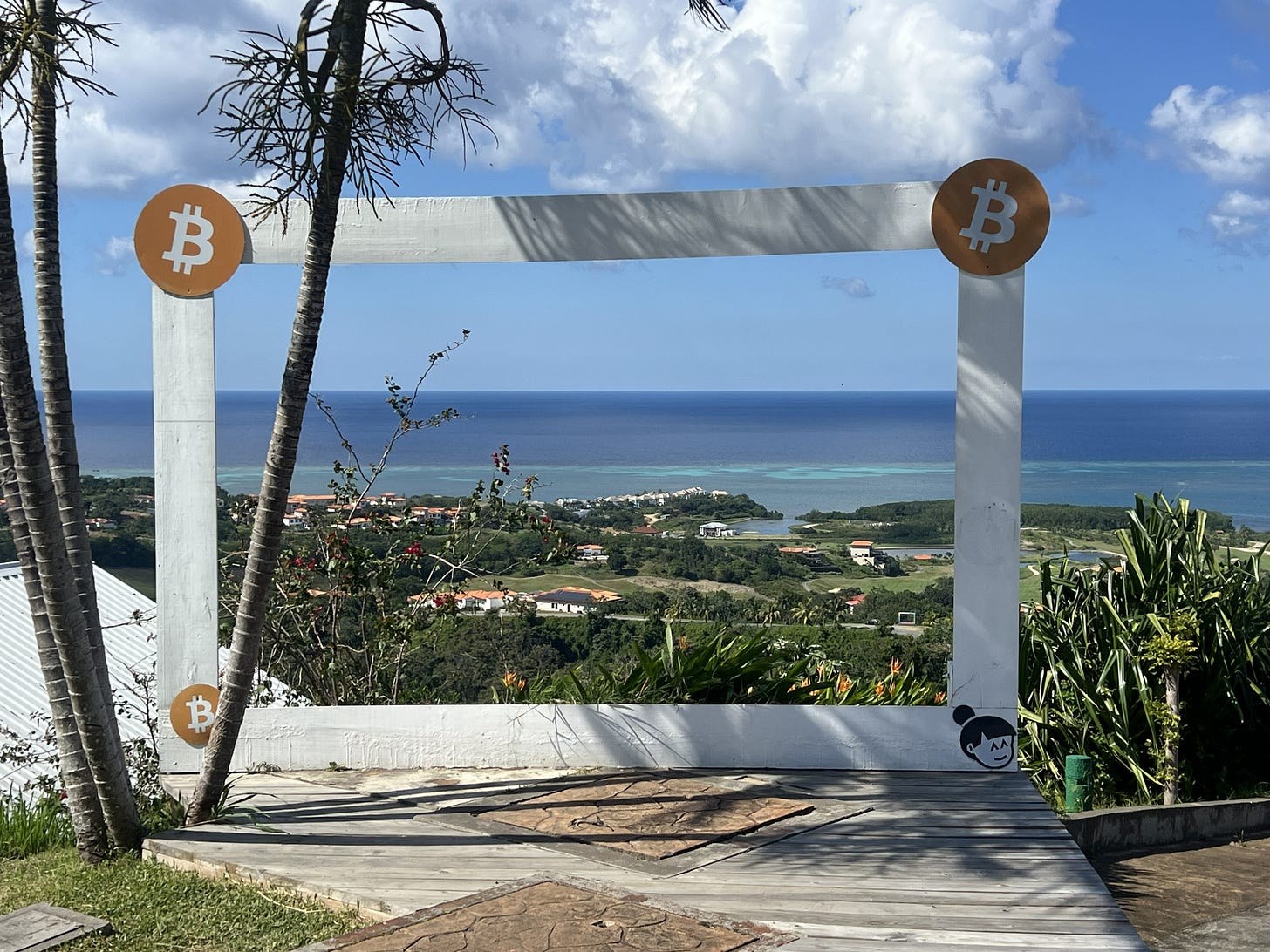

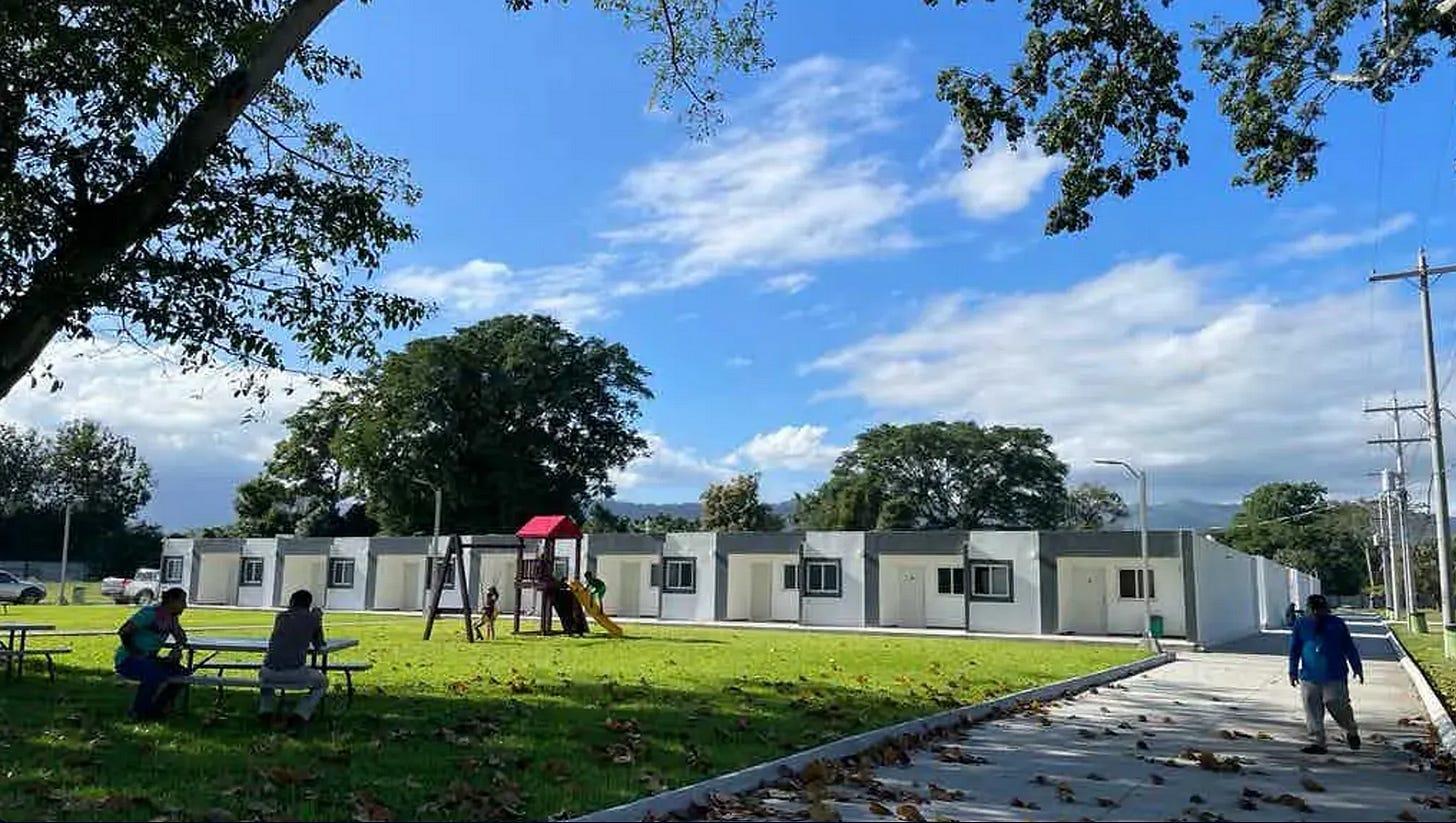





Great piece Olivier.
I have heard of Prospera but never knew about the underlying philosophy or some of the legal traits that you mentioned here.
The idea of competitive city-states make a lot of sense. First, it has historical precedent. Some of the most innovative societies on Earth have been city-states, from Ancient Greece to modern Singapore.
Second, as we see when trying to regulate businesss, the business is almost always a step ahead of the regulator. The best regulation, to keep business honest, is competition.
Competitive city states, so long as people could legally relocate, would ensure they would pass policies that benefit their people.
Something I've written about Risk & Progress as well. I wasn't aware that others were thinking this way.
Very interesting. Will be cool to see how this develops over time. Any plans to move to a charter city on your horizon then?